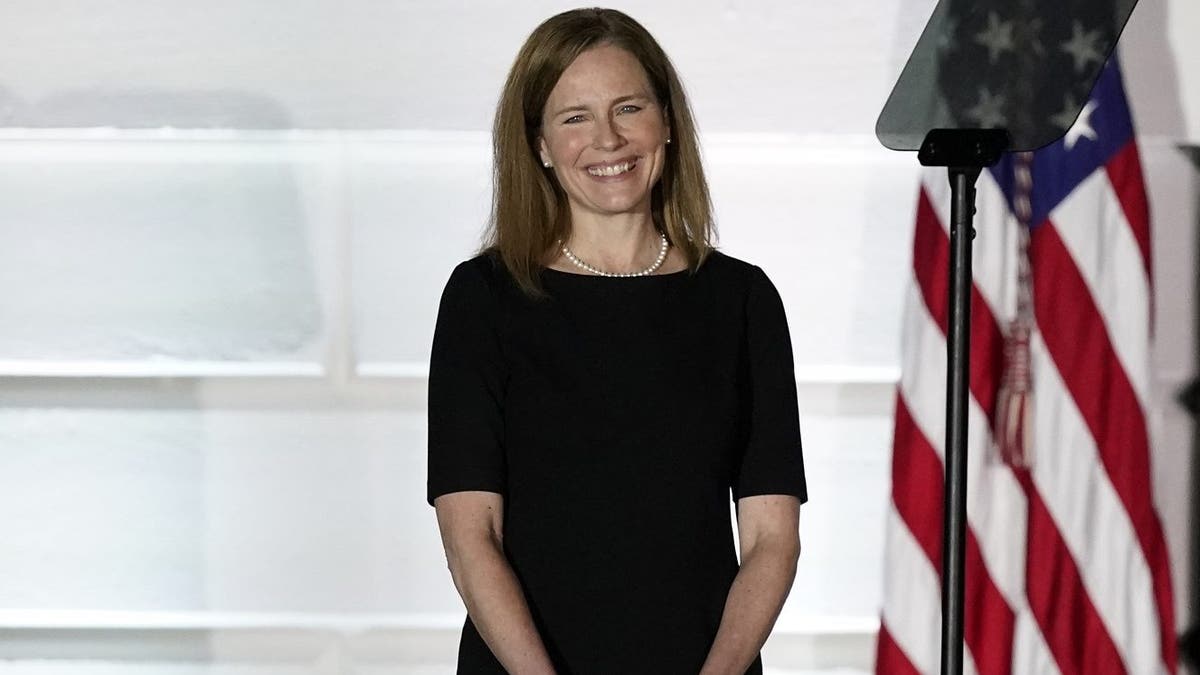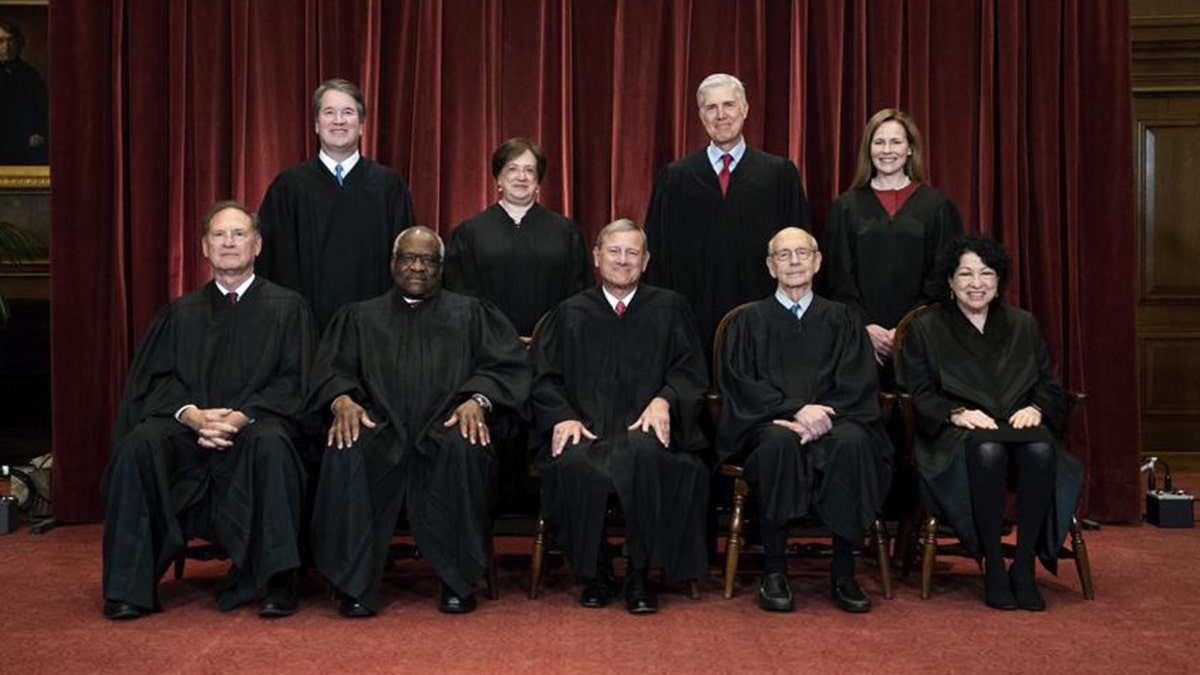Fox News Flash top headlines for June 3
Fox News Flash top headlines are here. Check out what's clicking on Foxnews.com.
Trump-appointed Supreme Court Justices Brett Kavanaugh, Amy Coney Barrett and Neil Gorsuch sided with liberal Justices Stephen Breyer, Sonia Sotomayor and Elena Kagan Thursday to endorse a narrow approach on how to apply a 1986 law against computer hacking.
The justices overturned the conviction of a police officer, Nathan Van Buren, who was paid to run a license plate search in violation of the police department's policy and, according to the federal government, the Computer Fraud and Abuse Act.
But Barrett, writing for the majority, said the officer technically did not access information he wasn't entitled to. Instead, he simply misused his access to information he was authorized to see. Therefore, the court said, the officer did not violate federal law.
"This provision covers those who obtain information from particular areas in the computer – such as files, folders or databases – to which their computer access does not extend," Barrett wrote in the majority opinion. "It does not cover those who, like Van Buren, have improper motives for obtaining information that is otherwise available to them."

Amy Coney Barrett listens as President Donald Trump speaks before Supreme Court Justice Clarence Thomas administers the Constitutional Oath to Barrett on the South Lawn of the White House White House in Washington, Monday, Oct. 26, 2020, after Barrett was confirmed to be a Supreme Court justice by the Senate earlier in the evening. (AP Photo/Alex Brandon)
CALIFORNIA CHURCH TO PAY $2M LEGAL FEES OVER COVID CLOSURES
The vote breakdown pitted the three Trump-appointed justices and the court's three liberals against the three more senior Republican-appointed justices: Chief Justice John Roberts and Justices Clarence Thomas and Samuel Alito.
The case is focused on a narrow issue of statutory interpretation rather than the broad constitutional issues that animate much of the hot-button debate around the Supreme Court. Therefore, it is not likely to reveal much about the justices' potential rulings or approach to other major cases on freedom of religion, guns, abortion and more.
But the vote breakdown – which comes after the court issued five consecutive unanimous opinions in recent weeks – further underscores that the court does not always rule simply on ideological lines as many Democrats calling on President Biden to pack the court allege. Some have speculated the several unanimous opinions in a row could be a message to pro-court-packing liberals that the court does not necessarily rule only on ideological lines.
Indeed, because Roberts was in the dissent on this case, the majority opinion was assigned to Barrett by Breyer, the most senior justice in the majority. Breyer, one of the court's liberals, recently cautioned Democrats that packing the court might harm its legitimacy. These comments caused many on the left to double-down on calls for him to retire.
The government’s reading… would… criminalize everything from embellishing an online-dating profile to using a pseudonym on Facebook
On the merits of the case itself, Barrett and the justices in the majority warned that the government's broad reading how a person may not use a computer could have the accidental effect of criminalizing millions of Americans for things they do every day.
JONATHAN TURLEY: SUPREME COURT'S RECENT UNANIMOUS 9-0 DECISIONS – ARE JUSTICES SENDING A MESSAGE?
"[T]he government’s interpretation of the statute would attach criminal penalties to a breathtaking amount of commonplace computer activity," Barrett wrote. "If the ‘exceeds authorized access’ clause criminalizes every violation of a computer-use policy, then millions of otherwise law-abiding citizens are criminals."
"[O]n the government’s reading of the statute, an employee who sends a personal e-mail or reads the news using her work computer has violated the CFAA," Barrett continued. The government's reading of the law, she added, would "criminalize everything from embellishing an online-dating profile to using a pseudonym on Facebook."
The case was the first time that Barrett and Thomas voted differently on a case since Barrett joined the bench last year. In the dissent, Thomas wrote that Barrett's "interpretation is contrary to the plain meaning of the text."
"The question here is straightforward: Would an ordinary reader of the English language understand Van Buren to have ‘exceed[ed] authorized access’ to the database when he used it under circumstances that were expressly forbidden?" Thomas said. The "necessary precondition" that the officer was only entitled to search the license plate database "for law enforcement purposes," Thomas also said, "was absent."

FILE - In this April 23, 2021, file photo members of the Supreme Court pose for a group photo at the Supreme Court in Washington. Seated from left are Associate Justice Samuel Alito, Associate Justice Clarence Thomas, Chief Justice John Roberts, Associate Justice Stephen Breyer and Associate Justice Sonia Sotomayor, Standing from left are Associate Justice Brett Kavanaugh, Associate Justice Elena Kagan, Associate Justice Neil Gorsuch and Associate Justice Amy Coney Barrett. Barrett and Thomas came down on opposite sides of a case for the first time since she joined the bench Thursday. (Erin Schaff/The New York Times via AP, Pool, File
SUPREME COURT PREPARES FINAL PUSH TO RELEASE HOT-BUTTON RULINGS, AMID RETIREMENT TALK
"A valet, for example, may take possession of a person’s car to park it, but he cannot take it for a joyride," Thomas said.
The case is also notable in that Barrett, the youngest justice at 49, wrote the opinion on what is yet another issue of federal laws struggling to keep up with the rapid evolution of technology in society. When the court ruled last year that companies can trademark generic URLs in a victory for Booking.com, the opinion was written by late Justice Ruth Bader Ginsburg, who was 87.
Since then, Breyer wrote the majority opinion in a ruling backing Google in a copyright dispute about whether Google's use of Oracle's code in developing its Android smartphones was "fair use." Breyer is 82.
The court will face another major tech-related case this term: A dispute over whether a high school was justified in booting a cheerleader off her team for a profane Snapchat post about the team that she made while she was off of school grounds.
CLICK HERE TO GET THE FOX NEWS APP
The case could have major ramifications for how schools balance student speech rights with efforts to fight cyber-bullying. And it will be decided by a group of justices whose median age is 66.
Fox News' Bill Mears and Shannon Bream contributed to this report.





















